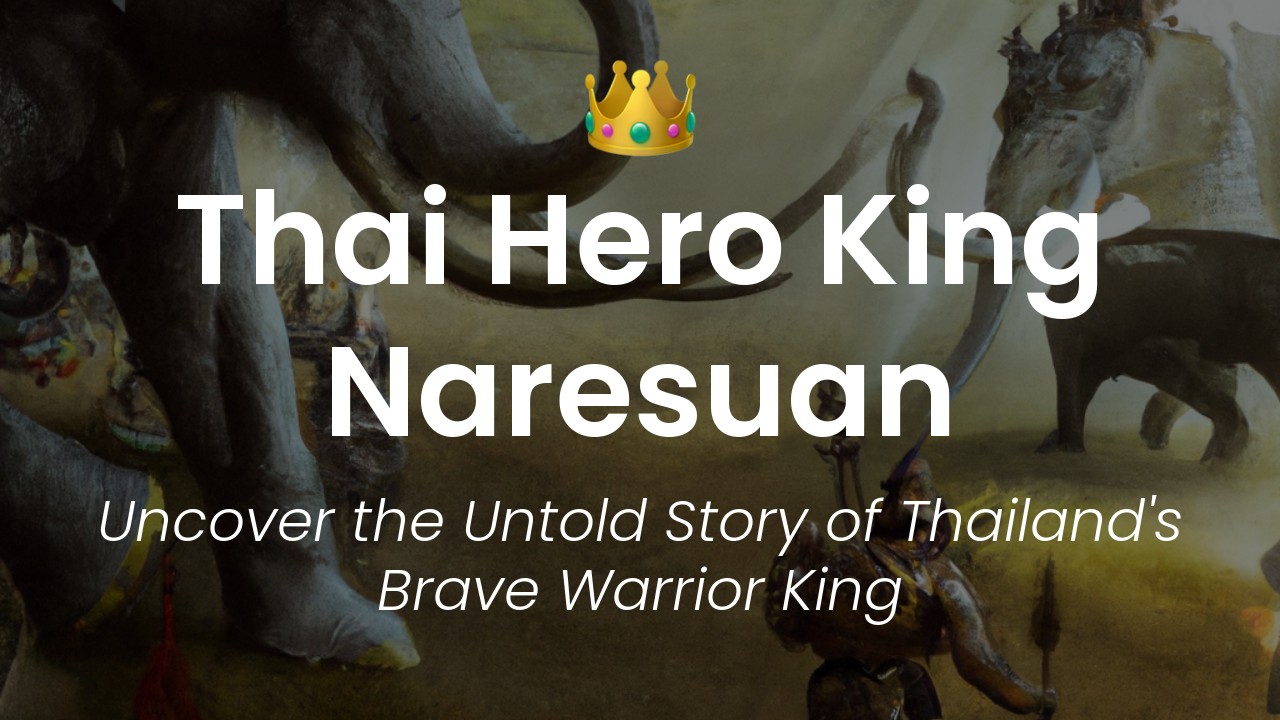As a native of Thailand, I have a deep appreciation for my country's rich history and culture. In particular, I have always been fascinated by the stories of the legendary heroes who played significant roles in shaping the nation. Among these heroes, there is one that stands out to me as a symbol of courage and resilience: King Naresuan.
Born in 1555, King Naresuan was the third monarch of the Ayutthaya Kingdom. He is best known for his valiant efforts to defend Thailand from the Burmese invasion in the late 16th century. With his military tactics and strategic alliances, he managed to repel the Burmese assailants and secure Thailand's independence.
But King Naresuan was more than just a military leader. He was also a skilled diplomat, a lover of literature and culture, and a patron of the arts. He was deeply committed to the well-being of his people and worked tirelessly to improve their lives. Under his reign, Thai culture flourished, and the kingdom experienced a time of remarkable prosperity.
In this article, I will take you on a journey through the life and legacy of King Naresuan, exploring his remarkable achievements, his struggles and victories, and his enduring impact on Thailand's history and culture. Join me as we discover the epic hero who continues to inspire and captivate generations.
Early Life of King Naresuan
King Naresuan, also known as Sanphet II, is considered one of Thailand's greatest heroes. Born in 1555 in the city of Phitsanulok, he was the third son of King Maha Thammaracha and Queen Wisutkasat. As a child, he was raised in the palace with his siblings, including his older brother, Prince Ekathotsarot, who would eventually become his lifelong friend and ally.
As a young prince, Naresuan received an excellent education, learning the art of war, Ayutthaya history, and religion. He also excelled in elephant riding and became a skilled rider. His father was particularly fond of him and would often promote him to positions of power and authority.
One of Naresuan's most significant achievements came when he was merely nine years old. King Bayinnaung of Burma invaded Ayutthaya and captured Naresuan and his older brother, Prince Ekathotsarot. The Burmese king saw potential in the young prince and offered him a position in his court. However, Naresuan refused to betray his homeland and instead pledged to defend Ayutthaya against the Burmese.
Fight Against the Burmese Empire
As a result of his refusal to defect, Naresuan was kept as a prisoner of war for several years. During his captivity, he learned a great deal about the Burmese military tactics and began to plot his escape. In 1572, Naresuan and his brother managed to escape and returned to Ayutthaya, where they were welcomed as heroes.
Upon his return, Naresuan was named the governor of Phitsanulok by his father, and he began to prepare Ayutthaya's defenses against future Burmese invasions. In 1581, the Burmese army once again invaded Ayutthaya, led by King Nanda Bayin. Naresuan saw this as an opportunity to exact revenge and challenged Nanda Bayin to a one-on-one elephant battle.
The Battle of Nong Sarai
The Battle of Nong Sarai, also known as the "Elephant Battle," took place on January 18, 1593. Naresuan rode an elephant named Phraya Chakraphat and was armed with a double-bladed sword. Nanda Bayin rode an elephant named Kanthararok and wielded a short sword.
The two kings engaged in a fierce battle, with Naresuan eventually emerging victorious. He struck Nanda Bayin on the head with his sword, killing him instantly. This victory marked the end of Burmese dominance over Ayutthaya and solidified Naresuan's status as a national hero.
Death and Legacy
Naresuan continued to rule Ayutthaya until his death in 1605. During his reign, he restored and built numerous temples and monuments, including the Wat Phra Si Sanphet and the Naresuan Bridge. Today, he is still remembered as one of Thailand's most significant historical figures.
Celebrations in his Honor
To this day, Thailand celebrates King Naresuan with an annual holiday known as Thai Armed Forces Day. The holiday, which falls on January 18, commemorates the Battle of Nong Sarai and celebrates the bravery and heroism of the Thai military.
In addition to Armed Forces Day, there are numerous festivals and events across Thailand that honor King Naresuan. These events include the Naresuan Cup, a national elephant-back battle competition, and the Naresuan Film Series, a popular series of historical films.
Depiction in Thai Pop Culture
King Naresuan remains a beloved and iconic figure in Thai culture, with his story inspiring countless works of art, film, and literature. In 2006, a six-part film series based on his life was released, titled "Legend of King Naresuan." The film was a massive success in Thailand and has since been released internationally.
In addition to film adaptations, King Naresuan has been featured in countless novels, plays, and television shows. His story has become an integral part of Thai pop culture, and his legacy continues to inspire new generations of Thais.







